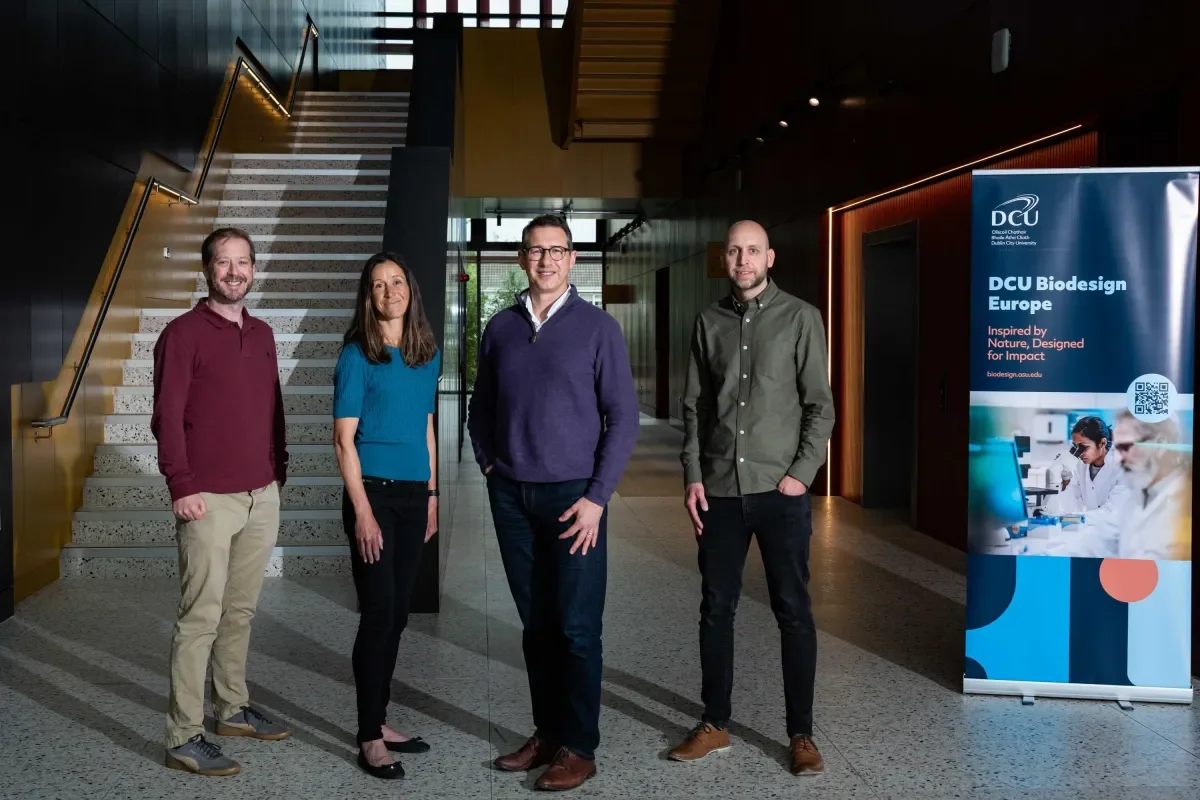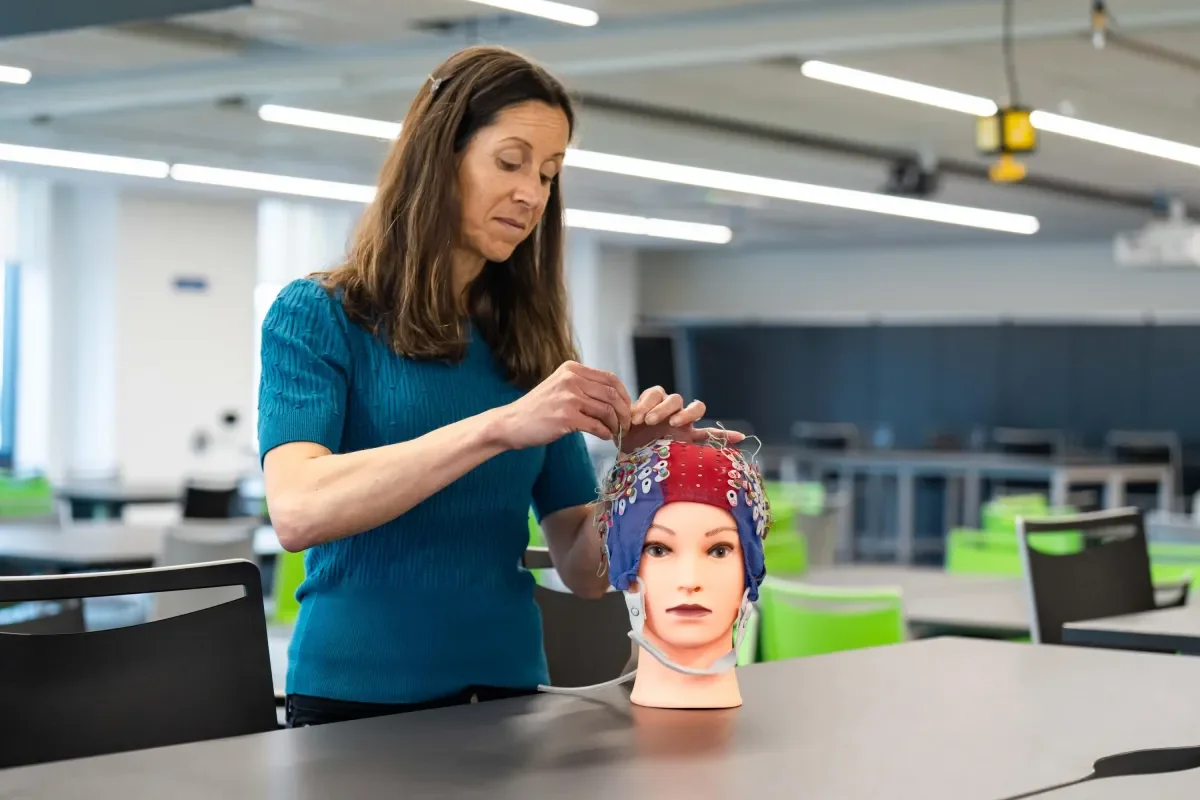

DCU and Arizona State University announce projects for €1 million transatlantic PhD programme
One of the chosen projects will seek to develop a lightweight, wearable sensor system to monitor brain and muscle activity. The other seeks to tackle hard-to-treat breast cancers by identifying new indicators and therapies through drug screening and advanced, chip-based tumour simulation. Both projects emphasize personalised care and recovery.
Following an internationally peer-reviewed competition, two research teams have been selected to receive funding through the programme. The initiative will support four PhD researchers over four years, with two based at DCU and two at ASU. The teams will focus on innovative breast cancer research and advanced wearable sensor technologies.
Dr Shirley Coyle from DCU and Dr Sui Yang from ASU will lead the ‘Wearable Metasurface-Enhanced fNIRS Biosensors for Neurorehabilitation project.’ This interdisciplinary project aims to develop a lightweight, wearable biosensing system using advanced metasurface technology consisting of ultra-thin artificial surfaces to enhance functional near-infrared spectroscopy (fNIRS), a brain and muscle imaging technique that uses light to measure brain activity more efficiently than large scanning equipment used in medical settings.
By combining ASU’s expertise in optical metamaterials with DCU’s leadership in wearable sensing and rehabilitation technologies, the team will work to create a portable device capable of assessing neuromotor function in real-world settings. which could then be used to monitor brain and muscle activity in stroke patients to support personalised recovery and home-based therapy applications.

Dr Paul Buchanan and Dr Alex Eustace from DCU, and Dr Mehdi Nikkah and Dr Jin Park from ASU will work on the ‘Decoding the TP53 Enigma in Triple-Negative Breast Cancer.’ The team will work to unravel how gene mutations in the TP53 gene drive treatment resistance in triple-negative breast cancer. By integrating DCU’s expertise in calcium signalling and drug screening, along with ASU’s advanced 3D ‘tumor-on-chip’ models, the team will study both transcriptional and non-transcriptional roles of mutant p53 in regulating cell death. The chip models are essentially miniature laboratory platforms that recreate cancer tissues and their surroundings. The goal is to identify new biomarkers and therapies that can restore precision to treatment in hard-to-treat breast cancers, paving the way for more personalised and effective cancer care.
The goal is to uncover new biomarkers and therapeutic targets that can lead to personalised treatments for patients with hard-to-treat breast cancer. Ultimately, the research aims to pave the way for smarter, more effective therapies that could extend to other cancers driven by TP53 mutations.
Dublin City University’s Biodesign Europe and Biodesign Institute at ASU are deepening their longstanding transatlantic partnership through a joint investment of approximately €1M in their Collaborative Doctoral Programme, launched in September 2024.

Dublin City University’s Biodesign Europe and Arizona State University’s Biodesign Institute have deepened their longstanding transatlantic partnership through a joint investment of approximately €1M in their Collaborative Doctoral Programme, which was launched in September 2024.
Prof Nick Dunne, Executive Director of DCU Biodesign Europe said:
“These innovative projects exemplify the mission of the ASU–DCU Collaborative Doctoral Programme: to tackle urgent global health challenges through world-class, interdisciplinary research. By uniting complementary expertise across institutions and disciplines, we’re not only advancing solutions to major global health challenges, we’re also offering our PhD researchers a unique international training experience, working across institutions, cultures, and scientific disciplines, equipping them with the skills, networks, and international perspective they need to thrive in a globally connected research landscape”.
Dr Joshua La Baer, Executive Director of the ASU Biodesign Institute said:
“We are committed to accelerating discoveries that improve human health, and that requires bold, collaborative science. This programme creates an environment where breakthrough ideas can thrive. By engaging our researchers and PhD students in shared projects that span continents and disciplines, we’re advancing cancer biology and wearable diagnostics, and supporting a new generation of globally-minded scientists equipped to tackle tomorrow’s health challenges.”
ASU and DCU have been international partners since 2006, a collaboration that led to the establishment of Biodesign Europe in 2020, DCU’s sister institute to ASU’s Biodesign Institute. Both institutes are dedicated to accelerating the translation of laboratory discoveries into real-world applications that improve health, promote sustainability and enhance global security.
